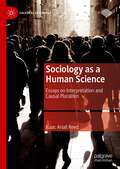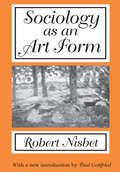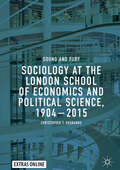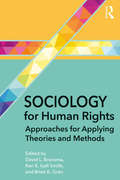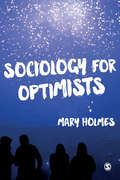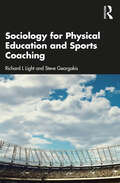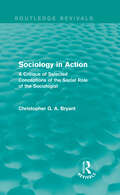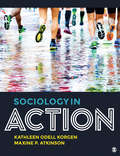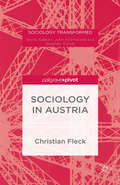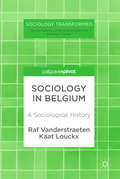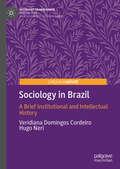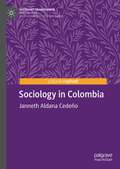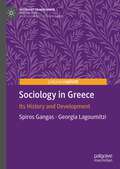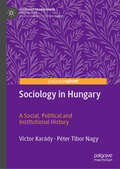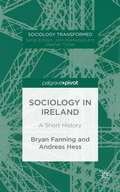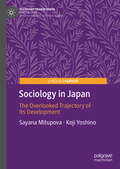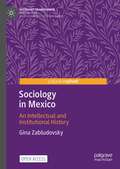- Table View
- List View
Sociology as a Human Science: Essays on Interpretation and Causal Pluralism (Cultural Sociology)
by Isaac Ariail ReedSociology as a Human Science is a set of foundational, wide-ranging and updated essays from Isaac Ariail Reed. Gathered together for the first time with a new introduction, they articulate a distinct perspective on concept and method in social science. Reed writes about realism and positivism, postmodernism and empiricism, mechanisms and causality, and power and history, developing thereby an understanding of the key debates out of which 21st-century sociology has developed. Carefully considering all manner of arguments in metatheory and epistemology and moving towards a program of interpretive explanation focused on culture and power, Reed places sociology at the center of debates about knowledge production across the humanities and social sciences. His reconstructive approach, positioned “after the posts” (poststructuralism, postmodernism, and postcolonialism) provides a way for interpretive sociology to provide analytically sound, theoretically extensive, and empirically rich understandings of social life.
Sociology as a Population Science
by John H. GoldthorpeJohn Goldthorpe is one of Britain's most eminent sociologists and a strong advocate of quantitative sociology. In this concise and accessible book, he provides a new rationale for recent developments in sociology which focus on establishing and explaining probabilistic regularities in human populations. Through these developments, Goldthorpe shows how sociology has become more securely placed within the 'probabilistic revolution' that has occurred over the last century in the natural and social sciences alike. The central arguments of the book are illustrated with examples from different areas of sociology, ranging from social stratification and the sociology of the family to the sociology of revolutions. He concludes by considering the implications of these arguments for the proper boundaries of sociology, for its relations with other disciplines, and for its public role.
Sociology as an Art Form
by Robert Nisbet""One of our most original social thinkers,"" according to the New York Times, Robert Nisbet offers a new approach to sociology. He shows that sociology is indeed an art form, one that has a strong kinship with literature, painting, Romantic history, and philosophy in the nineteenth century, the age in which sociology came into full stature. Sociology as an Art Form is an introduction for the initiated and the uninitiated in so-ciology.Nisbet explains the degree to which sociology draws from the same creative impulses, themes and styles (rooted in history), and actual modes of representa-tion found in the arts. He shows how the founding sociologists such as Marx, Weber, Durkheim, and Simmel constructed portraits (of the bourgeois, the worker, and the intellectual) and landscapes (of the masses, the poor, the factory system), all reflecting and contribut-ing to identical portraits and landscapes found in the literature and art of the period. In addition to marking the similarities between sociologists' and artists' efforts to depict motion or movement, Nisbet emphasizes the relation of sociology to the fin de siecle in art and literature, with examples such as alienation, anomie, and degeneration. He creates an elegant, brilliantly reasoned appraisal of sociology's contribution to modern culture.This book will be of interest to sociologists, artists, and anyone interested in how the fields relate to one another.
Sociology at the London School of Economics and Political Science, 1904–2015: Sound and Fury
by Christopher T. HusbandsThis book provides an original overall account of the history of sociology at the London School of Economics and Political Science, where the first sociology course as part of a conventional university degree programme in the UK was taught. Thus, the book is unique in its contribution to an important part of the history and development of sociology in the UK.The chapters discuss the names that – at least until the post-war period – are identified as central to the early phase of British sociology. Husbands documents the impact and influence of these leading figures through material in numerous previously little-used archives. Also explored are the culture of LSE Sociology students, their attitudes, political orientations, and academic attainments. The reputation and influence of LSE Sociology on the general development of the subject in the UK are also assessed. The book will be of interest to sociology students and scholars wanting to know about the discipline’s history, as well as to those with a broader interest in higher education policy.
Sociology class 9 - Karnataka board: ಸಮಾಜಶಾಸ್ತ್ರ 9 ನೇ ತರಗತಿ - ಕರ್ನಾಟಕ ಮಂಡಳಿ
by Karnataka Patya Pusthaka SanghaSociology text book for 9th Standard Kannada Medium, Karnataka State
Sociology for Human Rights: Approaches for Applying Theories and Methods
by Keri E. Iyall Smith David L. Brunsma Brian K. GranAs sociologists deepen their examinations of human rights in their teaching, research, and thinking, it is essential that such work is conducted in a manner that is both mindful and critical of the knowledge we are building upon in sociology and human rights. As the authors of this volume reveal, creating sociological knowledge that examines human rights for the expansion of human rights is something that sociologists are well equipped to undertake, whether through the use of mathematics, comparative-historical analysis, the study of emotions, conversations, or social psychology. In these chapters you will find the roots of the study of human rights deep within sociological research and thinking as well as emerging techniques that will push the discipline as it seeks to expand understanding of human rights together with so many other aspects of the social condition.
Sociology for Optimists
by Mary HolmesBreaking away from the idea that sociology only ever elaborates the negative, Sociology for Optimists shows that sociology can provide hope in dealing with social issues through critical approaches that acknowledge the positive. From politics and inequality to nature and faith, Mary Holmes shows how a critical and optimistic sociology can help us think about and understand human experience not just in terms of social problems, but in terms of a human capacity to respond to those problems and strive for social change. With contemporary case studies throughout grounding the theory in the real world, this is the perfect companion/antidote to studying sociology.
Sociology for Optimists
by Mary HolmesBreaking away from the idea that sociology only ever elaborates the negative, Sociology for Optimists shows that sociology can provide hope in dealing with social issues through critical approaches that acknowledge the positive. From politics and inequality to nature and faith, Mary Holmes shows how a critical and optimistic sociology can help us think about and understand human experience not just in terms of social problems, but in terms of a human capacity to respond to those problems and strive for social change. With contemporary case studies throughout grounding the theory in the real world, this is the perfect companion/antidote to studying sociology.
Sociology for Physical Education and Sports Coaching
by Richard L Light Steve GeorgakisThis book introduces the fundamentals of sport sociology and social issues in sport for students of physical education (PE) and coaching. It provides an accessible, jargon-free foundation for understanding the relationships between sport, education, and wider society that puts into context the reader's applied studies in PE and coaching. Drawing on cutting-edge research, this book examines core topics in the study of sport and society, including the origins of sport, sport education, sport as business, commodification, globalisation, sport and health, sport and the media, gender, migration, and Indigenous people in sport. Throughout this book, in-depth ‘commentary’ pieces look closely at particular pieces of research that illustrate the sociological themes being examined, from the impact of sport media on school children to the effects of hegemonic masculinity in rugby. This book is invaluable reading for any course on sport and society, physical education, sports coaching, or sport development.
Sociology in Action: A Critique of Selected Conceptions of the Social Role of the Sociologist (Routledge Revivals)
by Christopher G. BryantThis book, first published in 1976, discusses four classical paradigms for sociology – the positivism of Saint-Simon and Comte, Durkheim, Marx and Weber – and four contemporary developments or revisions of them – the sociologie active of Dumazedier and his colleagues in France, sociology in Socialist Poland, the work of Dahrendorf and the ‘new sociology’ of Mills and his successors. Christopher Bryant suggests that no neutral language exists in which to compare the characteristics of these different paradigms, yet highlights those features which are common to all of them. Unique in its approach and analysis of the relationship between sociology and action, this book is of value and interest to students of sociology and theory and professional sociologists.
Sociology in Action: Sociology, Social Change, And Social Justice
by Kathleen Odell Korgen Maxine AtkinsonWake up your introductory sociology classes! Sociology in Action helps your students learn sociology by doing sociology. Sociology in Action will inspire your students to do sociology through real-world activities designed to ignite their sociological imaginations. This innovative new text immerses students in an active learning experience that emphasizes hands-on work, application, and learning by example. Each chapter explains sociology's key concepts and theories and pairs that foundational coverage with a series of carefully developed learning activities and thought-provoking questions. You choose the activities that will best engage your students, fit the format of your course, and meet your course goals.
Sociology in Action: Sociology, Social Change, And Social Justice
by Kathleen Odell Korgen Maxine AtkinsonWake up your introductory sociology classes! Sociology in Action helps your students learn sociology by doing sociology. Sociology in Action will inspire your students to do sociology through real-world activities designed to ignite their sociological imaginations. This innovative new text immerses students in an active learning experience that emphasizes hands-on work, application, and learning by example. Each chapter explains sociology's key concepts and theories and pairs that foundational coverage with a series of carefully developed learning activities and thought-provoking questions. You choose the activities that will best engage your students, fit the format of your course, and meet your course goals.
Sociology in Argentina: A Long-Term Account (Sociology Transformed)
by Juan Pedro BloisThis Palgrave Pivot offers a comprehensive portrayal of the development of sociology in Argentina from the mid-1950s to the present day. This first long-term account in English maps the discipline’s troubled trajectory and its close relation to the broader (and turbulent) Argentinian political and economic context, and provides a dramatic exemplification of the politicization and polarization of an academic field and its consequences. Divided in seven chapters, this book examines the sharply different phases that the discipline went through: from the pioneering 1950s, in which sociology was presented as a “science”, to the activist revolt in the 1960s, led by the student movement, to the traumatic experience of the 1970s, when a cruel dictatorship was established and many sociologists were persecuted, and from its progressive recovery from the 1980s to its current growing (yet unstable) presence within academia, and within state agencies, corporations and consulting agencies, and NGOs. This work will appeal to social scientists and students interested in the relations between academia and politics, and to a general readership interested in the recent history of Argentina and Latin-America.
Sociology in Austria since 1945 (Sociology Transformed)
by C. FleckSociology in Austria has been frequently affected by political developments in the country. This first history of sociology in Austria examines the impact of the break-up of the Habsburg Empire and of two consecutive dictatorships, which destroyed academic freedom by means of forced migration and imprisonment. Even after 1945 the re-established Second Republic did not dismiss professors promoted during the Nazi period, and failed to invite exiled academics to return home. The author argues that the result has been a continuation of favouritism and conformism, with compliance to political regimes sanctioned at the expense of meritocracy and that in the light of this chequered past we should celebrate instances of de-institutionalization.
Sociology in Belgium
by Raf Vanderstraeten Kaat LouckxThis book provides a historical-sociological analysis of the history of sociology in Belgium from the late-nineteenth until the early-twenty-first century. It sheds new light on the social structures that shaped and shape the orientations and work of sociologists in Belgium. The impact of three structural factors is discussed in more detail: religion, language and publication imperatives. Starting from analyses of these structural factors, this book presents a detailed analysis of the genesis and institutionalization of different sociologies in Belgium. It sheds light on the kinds of sociological knowledge that are or are not valued in Belgium. This book constitutes an important contribution to the sociological history of sociology and the development of a reflective historical sociology, and will appeal to students and scholars of social theory, as well as readers interested in the history of Contemporary Belgium.
Sociology in Brazil: A Brief Institutional and Intellectual History (Sociology Transformed)
by Veridiana Domingos Cordeiro Hugo NeriThis book provides an overview of the institutional and intellectual development of sociology in Brazil from the early 1900s to the present day; through military coups, dictatorships and democracies. It charts the profound impact of sociology on Brazilian public life and how, in turn, upheavals in the history of the country and its universities affected the its scientific agenda. This engaging account highlights the extent of the discipline’s colonial inheritance, its early institutionalization in São Paulo, and its congruent rise and fall during repeated regime changes. The authors’ analysis draws on original research that maps the concentration of research interests, new developments, publications and centers of production in Brazilian sociology, using qualitative and quantitative data. It concludes with a reflection on the potential impact of the recent far-right turn in Brazilian politics on the future of the discipline. This book contributes a valuable country study to the history of sociology and will appeal to a range of social scientists in addition to scholars of disciplinary historiography, intellectual and Brazilian history.
Sociology in Colombia (Sociology Transformed)
by Janneth Aldana CedeñoThis Palgrave Pivot presents a historical reflection about the development of sociology in Colombia from the late nineteenth century into the mid-twentieth century, a period in which the process of professionalization in the discipline occurred due to the creation of university training programs, as well as the extension of research centers and groups nationwide. The book exposes the different interrelations at the local, regional and international ambits that, only in part, offer a similar panorama to what happened in other Latin American processes in relation to the academic institutionalization of sociology. The role of international networks and government initiatives, national and foreign, was central to this development and, in general, to the take-off of sociology in the country, as happened in others nations such as Argentina, Brazil and Mexico. This book argues that, in Colombia, having these networks and initiatives during the Cold War generated various tensions, which appeared early, between these forms of financing as a political effort to contain left movements in the region (especially after the Cuban Revolution) and the attempt to achieve an autonomous science. However, the Colombian case presents some peculiarities in the configuration of sociology at the national level. These are associated, to a large extent, with the phenomena that have been decisive in the history of the country: a nation without dictatorships between 1960 and 1970, unlike other South American countries, but with a restricted democracy that even today offers difficulties in order to accept alternative forces. This book also considers the effects of the longest armed conflict known in the continent and its own historical transformations in the face of the role played by various actors such as guerrillas, drug trafficking and paramilitary groups. The book thus discusses, under a specific case study, the role of science as well as the possibilities of social transformation through human action. This book constitutes not only a journey on the academic institutionalization and the professional practice of sociology in Colombia; it is also an opportunity to think about what is coming in this field in a possible post-conflict scenario.
Sociology in Ecuador (Sociology Transformed)
by Philipp AltmannThis Palgrave Pivot presents a concise yet comprehensive history of sociology in Ecuador. The case of Ecuador is especially interesting, as Ecuadorian sociology oscillated between theoretical debates—some of them out of time—and a constant search for ways of applying them to the local reality. In the decades after its formal creation in 1915, early academic sociology in Ecuador worked creatively with already outdated theories around positivism and organicism to understand the indigenous population's position, the regional fragmentation, and the formation of a coherent nation-state in Ecuador. After a short attempt of installing a more technical sociology in the 1960s, those topics were taken up and re-read by Marxist-inspired critical sociology after the 1970s, leading to the nation-wide institutionalization of one particular tradition that could connect to continental debates. This book engages with several relevant debates in social sciences and humanities, particularly by adding to the thriving research on social sciences and the role of the university and higher education in Latin America. Furthermore, it touches some recently influential topics in sociology: Ecuadorian sociology can be read as Southern Theory or engaged with from a postcolonial or decolonial perspective; the research on how ideas travel, are diffused or localized is vital for understanding sociology in Ecuador; the relation between academia and politics; and more.
Sociology in Germany: A History (Sociology Transformed)
by Stephan MoebiusThis open access book traces the development of sociology in Germany from the late 19th century to the present day, providing a concise overview of the main actors, institutional processes, theories, methods, topics and controversies. Throughout the book, the author relates the discipline’s history to its historical, economic, political and cultural contexts. The book begins with sociology in the German Reich, the Weimar Republic, National Socialism and exile, before exploring sociology after 1945 as a ‘key discipline’ of the young Federal Republic of Germany, and reconstructing the periods from 1945 to 1968 and from 1968 to 1990. The final chapters are devoted to sociology in the German Democratic Republic and the period from 1990 to the present day. This work will appeal to students and scholars of sociology, and to a general readership interested in the history of Germany.
Sociology in Greece: Its History and Development (Sociology Transformed)
by Spiros Gangas Georgia LagoumitziThis Palgrave Pivot provides a concise history of the development of sociology in Greece. It provides a compelling narrative of the discipline’s embryonic state, its promising beginnings that aligned with its contact with the then robust French and German accomplishments in sociology. It continues with sociology’s entanglement with modern Greece’s turbulent history during the Civil War and the junta years. It charts Greece's gradual recovery during the mid-1970s, which led to sociology’s institutionalization. Yet such institutional boom was not free of politicization processes, many of which proved residual and resilient, stemming from the dictatorship years, as well as from Greece’s dependency during its process of modernization. This book completes this historical account by reconsidering sociology’s gradual embrace of a multi-paradigmatic orientation, its opportunities in light of the burgeoning Greek EU membership and extroversion. It concludes with charting sociology’s position in the 21st century, facing challenges like the Great Recession and its impact in Greece as well as the COVID-19 pandemic.
Sociology in Hungary: A Social, Political and Institutional History (Sociology Transformed)
by Victor Karády Péter Tibor NagyThis book is the first English-language study of the social, intellectual and institutional history of sociology and the social sciences in Hungary. Starting with the emergence of the discipline in the early 20th century, Karady and Nagy chart its development throughout various transformations of Hungarian society: from the liberal Dual Monarchy, through the respective Christian and Stalinist regimes, and culminating in the modern scholarly field today. Drawing on large-scale prosopographical materials, the authors use empirically-based socio-historical analysis to measure the impact of successive and radical regime changes on the country's intellectual life. This will be an important and original point of reference for scholars and students of historical sociology, and Eastern European intellectual history.
Sociology in Ireland: A Short History
by Andreas Hess Bryan FanningThis book provides a short introduction to the emergence and development of sociology in Ireland until the present day. The institutionalization of the discipline came relatively late as it remained under the control of the Catholic Church. However, since the 1970s sociology has witnessed periods of considerable growth and professionalization.
Sociology in Japan: The Overlooked Trajectory of Its Development (Sociology Transformed)
by Sayana Mitupova Koji YoshinoThis Palgrave Pivot serves as a brief exploration of the evolution of sociological thinking in Japan from the Meiji era to the early 21st century. The authors unfold the narrative of societal changes, cultural shifts, and the interplay between tradition and modernity, tracing the footsteps of influential thinkers, movements, and key sociological themes that have shaped the collective consciousness of Japan. This book invites scholars and students alike to engage with the intricate fabric of Japanese society through a sociological lens.
Sociology in Mexico: An Intellectual and Institutional History (Sociology Transformed)
by Gina ZabludovskyThis open access book presents a condensed history of Sociology in Mexico from its origins, through to the middle of the 19th century and up to the present day. The book analyses the interaction between sociology and the main economic, political and social change in the country, including the 1910 Mexican Revolution, the main social movements, the role of the intellectual exiles from Spain and Latin America, and the participation of women, who have often remained invisible in the history of sociology. The book explores how sociological discourse played a fundamental role in the separation of secular and public education and the search for a ‘national project’ from 1868 onwards, despite the lack of an institute of social research until 1930; how sociology became an autonomous social science, led by a few intellectuals and public figures, as it became institutionalized in universities, and the effect this had on the development of the discipline; the influence of Marxism during the 1970s; and the progression from a process of specialization after the fall of the Berlin Wall to a new trend of working in collective projects with an increasing interdisciplinary perspective in the first decades of the 21st century.
